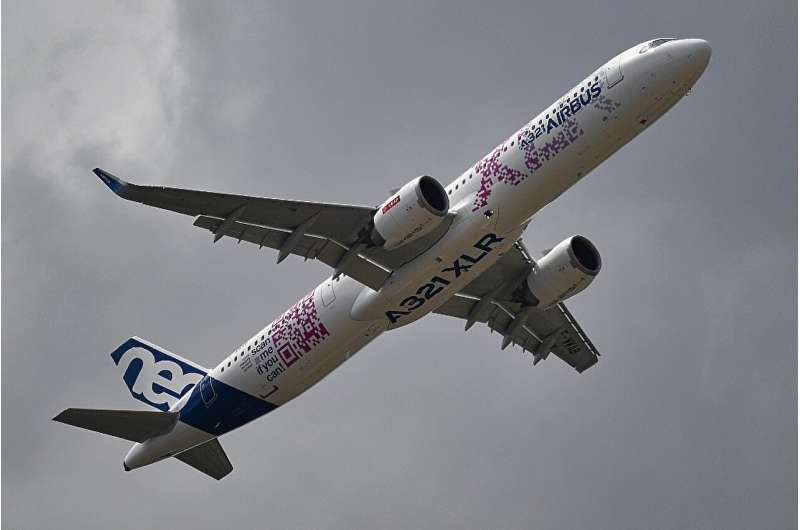Airbus and Boeing race to boost aircraft production

Airbus and Boeing both stepped up deliveries of commercial aircraft in the first half of this year, boosting revenue as they strive to ramp up production to meet demand from airlines.
Both aircraft manufacturers released results on Wednesday, with Airbus reporting a net profit of 1.06 billion euros ($1.17 billion) in the second quarter while Boeing suffered a $149 million loss following delays and cost issues in its defense and space program.
Both saw revenues jump as they delivered more aircraft to clients. Boeing boosted revenue by 18 percent during the quarter to $19.8 billion, while Airbus posted a 24 percent increase to $17.6 billion.
In the second quarter, US-based Boeing notched a 12 percent increase in commercial plane deliveries to 136.
Its European rival Airbus managed a 6.4 percent increase to 316 deliveries in the first half of the year.
As airlines have announced major new orders in response to robust travel demand following COVID-19 lockdowns, Airbus and Boeing have had trouble boosting production.
Both companies slashed output and cut staff during the pandemic as global air travel came to a near halt, and ramping it back up has proved slow and difficult for them and their suppliers.
‘Steady progress’
Boeing Chief Executive Dave Calhoun pointed to “steady progress” in the aerospace giant’s turnaround, calling demand strong in the company press release.
Boeing’s commercial plane program has been beset with various manufacturing and quality control issues in recent years that have limited deliveries for its top-selling jets, the 737 and 787 Dreamliner, pushing the company into loss.
In an interview on CNBC, Calhoun described the supply chain difficulties as “settling down” as he reviewed the ramp-up planned for the best-selling jets and reviewed a number of major contracts with carriers in India, Saudi Arabia and elsewhere.
Calhoun offered a somewhat more upbeat appraisal Wednesday as he mapped out the plan to increase production of the 737 MAX to 38 a month from 31 a month.
“Suppliers have been working diligently to sort of settle down and eliminate the constraints, and slowly and steadily we’re seeing fewer and fewer concerns,” Calhoun told CNBC, adding that the company plans to boost output to 50 per month down the road.
Boeing also announced new production targets for the 787 Dreamliner.
Later on a conference call with analysts, Calhoun characterized supply chain issues as still the “most significant” challenge facing the company, but said “it’s steadily getting better”.
Airbus constrained by suppliers
Airbus also highlighted the critical importance of ramping up production and continued supply chain difficulties.
“On the supply side, our deliveries continue to be paced by a few critical suppliers,” chief executive Guillaume Faury said in a conference call.
Airbus confirmed plans to make 75 of its best-selling single-aisle A320 family aircraft per month in 2026.
This production rate “is now the key reference point for the company”, it acknowledged.
But it dropped reference to making 65 A320 aircraft per month in 2024.
“Given the volatility in our supply chain and in our operations, we won’t give interim targets anymore,” said Faury.
“The overall trajectory and the landing point is what matters, we’ll continue to make tactical adjustments in our production as required,” he added.
Faury said a problem recently identified with Pratt and Whitney engines for the A320neo would not affect deliveries and Airbus would assist affected clients.
Airbus confirmed its target of delivering around 720 commercial aircraft this year.
Record order book
Faury said demand for its commercial aircraft remained strong, pointing to 800 orders announced at the Paris Air Show.
Net orders totalled 1,044 during the first half of the year, more than four times the amount during the first six months of 2022.
That is already close to its annual totals the past two years and puts Airbus within striking distance of its 2014 record of 1,590 aircraft.
“This demand is driven both by growth and fleet replacement as airlines invest in more fuel efficient fleets,” said Faury, noting its order book stands at a record 7,967 aircraft.
Airbus’ results were held back by a weak performance by its defense and space unit which was hit by a drop in revenues due to delays, although it did return to an operating profit.
Meanwhile, Boeing’s defense, space and security business operated at loss, hit by delays in the Starliner spacecraft and increased costs connected to the T-7A jet trainer program.
Even though Boeing’s commercial aircraft unit continued to operate at a loss the company beat analyst expectations and investors welcomed its revised production targets, driving the share price up 6.7 percent.
Airbus released its results after European markets closed for the day.
© 2023 AFP
Citation:
Airbus and Boeing race to boost aircraft production (2023, July 26)
retrieved 26 July 2023
from https://techxplore.com/news/2023-07-airbus-boeing-boost-aircraft-production.html
This document is subject to copyright. Apart from any fair dealing for the purpose of private study or research, no
part may be reproduced without the written permission. The content is provided for information purposes only.
For all the latest business News Click Here

